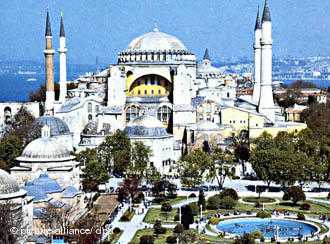Ordinary Azeris outraged by Moscow’s intervention in Georgia – but officials largely silent.
By Tamara Grigoryeva in Baku (CRS No. 455, 19-Aug-08)
“Our home looks like a dormitory now, because so many relatives have arrived,” said 23-year-old Azerbaijani Parvana Mamedova who has helped take care of a stream of relatives from Georgia’s Marneuli region, which has an Azerbaijani minority. “We don’t have enough space in our three rooms, but it’s our duty to receive them.”
After August 8, when Russian planes bombed the military base in Marneuli, two families of relatives decided to move to Baku, until the situation settles down. Only her uncle, Asif, stayed in Georgia and joined a unit of Azerbaijani volunteers to support the Georgian army.
Azerbaijan has strong ties to both Georgia and Russia. The private reaction in Azerbaijan, Georgia’s partner in the GUAM organisation and in several energy projects, has been stronger than the public one.
Azerbaijani foreign ministry spokesman Khazar Ibrahim has been virtually the only official to comment. “Azerbaijan recognises Georgia’s territorial integrity and believes that the conflict must be settled within [the] framework…of international law,” he said.
President Ilham Aliev has remained at the Olympic Games for the duration of the crisis and made no public comment.
Opposition politicians and commentators have criticised him for doing this at a time of conflict in the Caucasus and suggested that the president is too beholden to Russia, with which he signed a cooperation agreement last month.
“Our president preferred to stay and watch the Olympics and keep silent while the presidents of several other friendly countries personally arrived in Tbilisi and expressed their support for President Saakashvili,” said analyst Ilgar Mamedov.
“I think that this position can be explained by the president of Azerbaijan’s commitment to good relations with the leadership of Russia, and his wish to preserve stability in the country on the eve of the forthcoming presidential elections.”
Only last month, Aliev and Russian president Dmitry Medvedev signed a new cooperation treaty.
Political analyst Hikmet Hajizade said the reaction was understandable. “Azerbaijan fears for of its own security,” he said. “It’s obvious that Russia shouldn’t be driven crazy, because we have seen the consequences.”
The Azerbaijani public and media were much sharper in their reactions. There have been several statements accusing Russia of supporting separatists and urging it to withdraw. Six protest rallies have been held outside the Russian embassy in Baku.
In response, the Russian ambassador to Azerbaijan Valery Istratov has held two press conferences. At the first, only four journalists, mainly representing Russian media accredited in Baku, were invited, a decision the Azerbaijani news internet site day.az described as “the ambassador’s desire to evade tricky questions from Azerbaijani journalists”.
Inevitably, Azerbaijanis have also drawn parallels between the war over South Ossetia and their own unresolved conflict with Armenia over Nagorny Karabakh. “The parallels between these conflicts are obvious,” said Hajizade. “The conflict between Georgia and Ossetia will definitely have an impact on the Karabakh conflict. If the conflict ends with Russia’s full control over Georgia, it will be very bad for Azerbaijan. Georgia is our only route for our energy and transport projects to reach the outside world.”
Hajizade also believes that “many of those in Azerbaijan, who have called for a military solution to the Nagorny Karabakh conflict have learned what lies in store for a country which defies Russia but has no real allies. On the other hand, Hajizade sees one advantage in the current crisis, “The forgotten Caucasian conflicts have become a focus of attention of the world.”
As the situation deteriorated, Georgia announced it was quitting the Commonwealth of Independent States and urged other countries to follow suit. But Azerbaijan was cautious on this. “The decision to leave the CIS is Georgia’s internal affair. Each country has the right to take decisions independently,” said Azerbaijani deputy foreign minister Hafiz Pashayev.
The conflict over South Ossetia is hurting Azerbaijan economically. The country’s main oil export route, the Baku-Tbilisi-Ceyhan pipeline, was shut down anyway on August 5 after an explosion in eastern Turkey claimed by the PKK Kurdish rebels. The conflict ensured the closure of the other pipeline via Georgia, Baku-Supsa. Azerbaijan was forced to rely only on the alternative, Baku-Novorossisk via Russia. According to the Caspian Alliance Group, every day that the pipelines do not operate Azerbaijan loses more than 70 million dollars.
Energy experts and officials say this is a temporary disruption and that the pipelines via Georgia will soon be operating again.
Political analyst Rasim Musabekov called Russia’s actions in Georgia “deliberate energy blackmail towards Europe and Azerbaijan”.
“As soon as we started oil deliveries via the Baku-Novorossiysk pipeline, Russia started experiencing some problems,” he said. “This once again shows that the Baku-Novorossisk pipeline cannot be used as the main route to export Azerbaijani resources to Europe. Our main routes pass through Georgia. In the future we must pay more attention to their security.”
Tamara Grigoryeva is an AFP correspondent in Baku.





